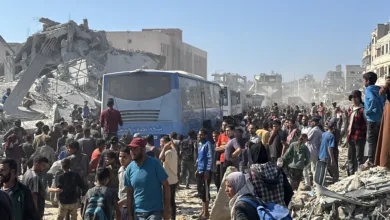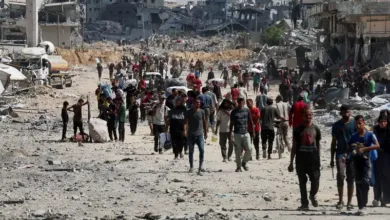UN Declares First Famine in Gaza City

The United Nations has made a grim announcement that Gaza City is officially facing its first famine in modern history. The declaration has shocked the international community and placed immediate focus on the humanitarian crisis that has been building for years. While aid agencies have long warned of deteriorating conditions, the UN’s formal acknowledgment of famine marks a devastating milestone that underscores the severity of the crisis.
This revelation has become the centerpiece of global Breaking News coverage, sparking urgent debates among governments, humanitarian organizations, and policy experts about how to address the situation before it spirals even further out of control.
Defining Famine: Why This Matters
Famine is not simply a term of exaggeration but a technical classification. According to the UN’s Integrated Food Security Phase Classification (IPC), famine is declared when at least 20% of households face extreme food shortages, acute malnutrition exceeds 30%, and the death rate surpasses two people per 10,000 per day.
By officially declaring famine in Gaza City, the UN is signaling that all three conditions have been met. This puts the crisis in a category that demands immediate global intervention, both to save lives and to prevent further deterioration across the region.
Historical Context of Gaza’s Struggles
Gaza has long been at the center of regional conflict, political isolation, and economic hardship. With restricted movement of goods and people, limited access to clean water, and widespread unemployment, the region has faced chronic challenges for decades.
However, recent escalations have worsened the situation to unprecedented levels. Blockades, ongoing conflict, and the destruction of infrastructure have severely restricted food supplies. Hospitals and health clinics are overwhelmed, and many families are forced to rely on minimal international aid that is insufficient to meet basic needs.
The declaration of famine is not just a humanitarian alarm—it is a stark reminder of how political and military dynamics directly affect human survival. The story has become a top headline in News cycles worldwide.
Humanitarian Impact on Civilians
For ordinary citizens of Gaza City, the famine has created a daily struggle for survival. Mothers report skipping meals to feed their children. Families scavenge for food wherever possible, while markets remain empty and prices of basic staples like flour and rice soar beyond affordability.
International aid agencies describe heartbreaking scenes of malnourished children, overcrowded hospitals, and communities with no access to clean water. The psychological toll is also severe, as families grapple with uncertainty, trauma, and the fear of starvation.
The situation has drawn comparisons to past crises in Africa and Asia, where famine not only decimated populations but also reshaped societies for generations.
International Political Reactions
The declaration has sent shockwaves across the international stage. Governments are divided on how to respond, with some calling for immediate intervention while others remain hesitant due to political complexities.
In Washington, the crisis is dominating U.S News discussions. Lawmakers are debating how much aid to send and what role the U.S. should play in pressuring regional actors to allow humanitarian corridors.
Meanwhile, European governments are facing public demands to act quickly, with citizens expressing outrage at images of starving children circulating across media outlets. The United Nations has urged wealthy nations to contribute more funding to relief programs, warning that delays could cost thousands of lives.
The Role of Regional Politics
Regional politics further complicate the crisis. Neighboring countries express concern about spillover effects, including mass migration and instability. Humanitarian convoys face significant obstacles due to border controls and ongoing conflict zones.
This dynamic highlights how famine is not just a humanitarian issue but also a political and security challenge. Without cooperation from multiple parties, even the best-funded relief efforts risk being blocked or delayed.
The crisis has become a major topic in World forums, with leaders debating whether new international agreements are needed to guarantee safe passage for aid.
Economic Consequences of the Famine
Beyond the immediate humanitarian suffering, the famine has broader economic implications. Local businesses in Gaza have collapsed, agricultural production has nearly halted, and unemployment rates are among the highest in the world.
For the global economy, the crisis reinforces ongoing debates about inequality, aid distribution, and the responsibility of wealthier nations to address humanitarian disasters. Some analysts warn that prolonged famine in Gaza could contribute to broader regional instability, which in turn affects trade flows, energy security, and investor confidence in the Middle East.
The narrative ties directly into wider debates about sustainable development, echoing themes from previous Trump News controversies where U.S. leadership—or lack thereof—was scrutinized on the global stage.
Media Narratives and Public Pressure
Media coverage has played a powerful role in shaping the response to the famine. Graphic images and firsthand accounts from aid workers have mobilized global public opinion. Protests have erupted in several major cities, demanding stronger action from world leaders.
Social media has amplified these calls, spreading both verified information and, at times, misinformation. While awareness is crucial, the risk of politicizing the famine also grows, potentially distracting from the urgent need for humanitarian aid.
Possible Solutions and International Responsibility
Experts agree that addressing famine requires both immediate and long-term solutions. Short-term, there is a need for rapid food aid, medical supplies, and safe humanitarian corridors. Long-term, sustainable development, infrastructure rebuilding, and political agreements are essential to prevent recurrence.
The international community faces a moral test: will nations rise to the challenge of preventing mass starvation, or will political gridlock leave millions to suffer?
The UN’s declaration of famine in Gaza City marks a tragic turning point in an already dire humanitarian crisis. For the people of Gaza, it is a daily fight for survival. For the international community, it is a test of values, compassion, and the willingness to act in the face of human suffering.
As this story continues to dominate Breaking News and World discussions, the question remains: will words turn into action before it is too late?




